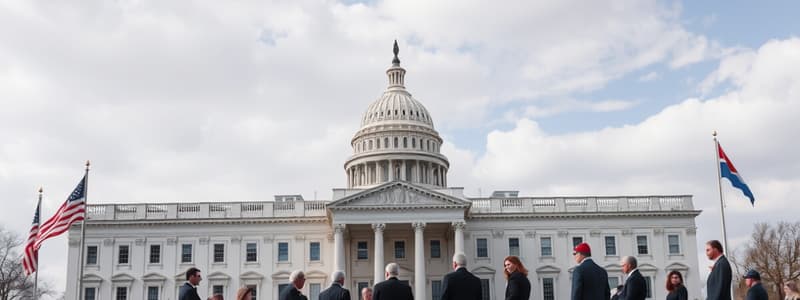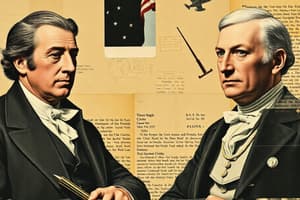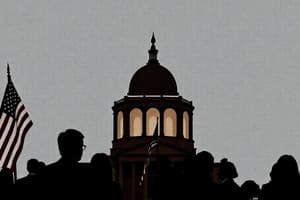Podcast
Questions and Answers
Limited government means minimizing government's power to tax and spend.
Limited government means minimizing government's power to tax and spend.
False (B)
Welfare liberals believe in regulating capitalism for the public good.
Welfare liberals believe in regulating capitalism for the public good.
True (A)
Ideologies are inclusive of religious and mystical philosophies.
Ideologies are inclusive of religious and mystical philosophies.
False (B)
Welfare liberals are socialists.
Welfare liberals are socialists.
Fascists support the value of individualism.
Fascists support the value of individualism.
All fascists are Nazis.
All fascists are Nazis.
Market conservatives believe the role of government should be to advance industry and commerce.
Market conservatives believe the role of government should be to advance industry and commerce.
Welfare liberals and neoclassical liberals differ on public policies but agree on Liberal values.
Welfare liberals and neoclassical liberals differ on public policies but agree on Liberal values.
John Locke advocated the establishment of the Liberal welfare state.
John Locke advocated the establishment of the Liberal welfare state.
Social programs, like the Affordable Care Act, are examples of negative freedoms.
Social programs, like the Affordable Care Act, are examples of negative freedoms.
Social conservatives believe government should infringe on individual rights and freedoms to protect customs and traditions.
Social conservatives believe government should infringe on individual rights and freedoms to protect customs and traditions.
Libertarians are philosophically closer to welfare liberals than market conservatives.
Libertarians are philosophically closer to welfare liberals than market conservatives.
The Bill of Rights is a statement of positive freedoms.
The Bill of Rights is a statement of positive freedoms.
Equal opportunity is a central tenet of Liberalism.
Equal opportunity is a central tenet of Liberalism.
Democrats and Republicans are ideologically different.
Democrats and Republicans are ideologically different.
Welfare liberals believe in state ownership of the means of production.
Welfare liberals believe in state ownership of the means of production.
Liberalism was an outcome of the Enlightenment.
Liberalism was an outcome of the Enlightenment.
Jean Jacques Rousseau said the state of nature was nasty, brutish, and short.
Jean Jacques Rousseau said the state of nature was nasty, brutish, and short.
Thomas Hobbes emphasized that the legitimacy of government is based on the consent of the governed.
Thomas Hobbes emphasized that the legitimacy of government is based on the consent of the governed.
Liberalism was founded on the idea that rationalism and science can advance the public good.
Liberalism was founded on the idea that rationalism and science can advance the public good.
Majoritarianism is a Liberal value.
Majoritarianism is a Liberal value.
Laissez-faire translates roughly as 'laziness is natural.'
Laissez-faire translates roughly as 'laziness is natural.'
Neoliberals are to the left of welfare liberals.
Neoliberals are to the left of welfare liberals.
Market conservatives and welfare liberals agree on the value of protecting individualism.
Market conservatives and welfare liberals agree on the value of protecting individualism.
All Nazis are fascists.
All Nazis are fascists.
Which one believes in an activist government?
Which one believes in an activist government?
What is a welfare state?
What is a welfare state?
Which Liberal political philosopher emphasized the significance of capitalism in a liberal society?
Which Liberal political philosopher emphasized the significance of capitalism in a liberal society?
In politics, facts are what?
In politics, facts are what?
What is the Welfare Liberal 'obstacle' to 'freedom'?
What is the Welfare Liberal 'obstacle' to 'freedom'?
Which answer is not one of the three components of an ideology?
Which answer is not one of the three components of an ideology?
Which ideological leaning prefers to place rights over order?
Which ideological leaning prefers to place rights over order?
Where is sovereignty vested in the United States?
Where is sovereignty vested in the United States?
What is the Liberal theory of the origins of government called?
What is the Liberal theory of the origins of government called?
What is another term for a representative government?
What is another term for a representative government?
Where did the 'Left' and the 'Right' terms originate?
Where did the 'Left' and the 'Right' terms originate?
What term describes a closed system of ideas that is used to simplify an understanding of society?
What term describes a closed system of ideas that is used to simplify an understanding of society?
What is the Classical Liberal 'obstacle' to 'freedom'?
What is the Classical Liberal 'obstacle' to 'freedom'?
Which Liberal political philosopher emphasized the role of private property and rule of law in a liberal society?
Which Liberal political philosopher emphasized the role of private property and rule of law in a liberal society?
What is the main distinction between democratic socialists and welfare liberals?
What is the main distinction between democratic socialists and welfare liberals?
Flashcards are hidden until you start studying
Study Notes
Limited Government and Ideologies
- Limited government seeks to restrain power, particularly in taxation and spending.
- Welfare liberals advocate for regulation of capitalism to protect the public good.
- Ideologies exclude religious and mystical philosophies.
- Welfare liberals are not synonymous with socialists.
- Fascism rejects the value of individualism; not all fascists are Nazis.
Political Ideologies and Their Beliefs
- Market conservatives support government action to promote industry and commerce.
- Welfare liberals and neoclassical liberals share Liberal values despite differing public policy views.
- John Locke did not propose the establishment of a Liberal welfare state.
- Social programs like the Affordable Care Act exemplify positive freedoms, not negative ones.
Key Liberal Concepts
- Social conservatives believe in government intrusion to preserve traditional customs.
- Libertarians align more with market conservatives than with welfare liberals.
- The Bill of Rights outlines negative, not positive, freedoms.
- Equal opportunity is fundamental to Liberalism, emphasizing fairness and access.
- Democrats and Republicans share core ideologies, contrary to common belief.
Foundations and Philosophies
- The Enlightenment significantly influenced Liberalism's development.
- Thomas Hobbes highlighted consent of the governed as the basis for government legitimacy.
- Liberalism posits that rationalism and science enhance public welfare.
Governance and Power Structures
- Majoritarianism is not a value embraced by Liberalism.
- Laissez-faire pertains to economic non-intervention, not laziness.
- Neoliberals sit to the right of welfare liberals along the political spectrum.
Understanding Welfare and Freedom
- Welfare liberalism endorses an activist government to address societal needs.
- A welfare state consists of government programs providing safety nets for those at risk.
- Adam Smith emphasized capitalism's importance within a liberal framework.
- "Values" govern political facts, influencing perceptions and policies.
- Poverty and discrimination are seen as obstacles to freedom in Welfare Liberalism.
Ideology and Political Structure
- Ideologies simplify societal understanding but can obscure complexity.
- The left prioritizes individual rights over societal order.
- Sovereignty in the US resides with the people, reflecting democratic principles.
- Social contract theory describes Liberal thoughts on governmental origins.
- Republicanism is synonymous with representative government.
Historical Context and Terminology
- The terms "Left" and "Right" in politics originated from the seating arrangement in the French Estates General.
- Classical liberals see government as a primary obstacle to personal freedom.
- John Locke emphasized the significance of property rights and the rule of law.
- Democratic socialists strive for a mixed economy that balances private and public interests, contrasting with welfare liberals' regulatory focus.
Studying That Suits You
Use AI to generate personalized quizzes and flashcards to suit your learning preferences.




